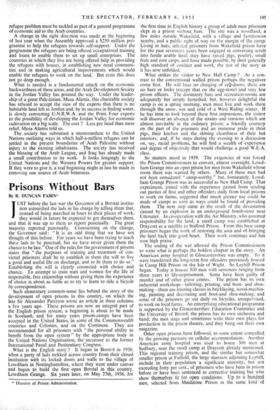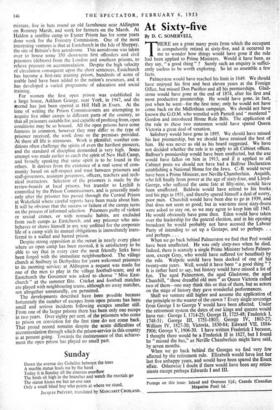Prisons Without Bars
By R. DUNCAN FAIRN*
IUST before the last war the Governor of a Borstal institu- tion astonished the lads in his charge by telling them that, instead of being marched in fours to their places of work, they would in future be expected to get themselves there, and that it was up to them to report punctually. The great Majority reported punctually. Commenting on the change, the Governor said : " It is an odd thing that we have not thought of this before. For years we have been trying to teach these lads to be punctual, but we have never given them the chance to be late." One of the rules for the government of prisons states that " the purposes of training and treatment of con- victed prisoners shall be to establish in them the will to live a good and useful life on discharge, and to fit them to do so." Establishing the will is clearly connected with choice and chance. To attempt to train men and women for the life of responsible, free citizenship without giving them the experience of choice is about as futile as to try to learn to ride a bicycle by correspondence. Such elementary common-sense lies behind the story of the development of open prisons in this country, on which the late Sir Alexander Paterson wrote an article in these columns a few years ago. These prisons are now an integral part of the English prison system; a beginning is about to be made in Scotland; and for many years prison-camps have been accepted in the United States, in some of the Commonwealth countries and Colonies, and on the Continent. They are recommended for all prisoners with " the personal ability to benefit from the open system " by the appropriate body in the United Nations Organisation, the successor to the former International Penal and Penitentiary Congress.
What is the English story ? It began in Borstal in 1930, when a party of lads trekked across country from their closed institution with its locked doors and walls to the village of Lowdham in Nottinghamshire, where they went under canvas and began to build the first open Borstal in This country, 'Lowdham Grange. Six years later, on May 27th, 1936, for
* Director of Prison Administration.
the first time in English history a group of adult men prisoners slept in a prison without bars. The site was a woodland, a few miles outside Wakefield, with a village and farmhouses nearby, and a public right of way on the margin of the camp. Living in huts, selected prisoners from Wakefield prison have for the past seventeen years been engaged in converting scrub into fertile arable land; they have raised pigs, poultry, small fruit and root crops, and have made possible, by their generally high standard of conduct and work, the rest of the story as it has now unfolded.
What strikes the visitor to New Hall Camp ? As a con- trast to the conventional walled prison perhaps the negatives come first. He will hear no clanging of cell-doors; there are no bars or locks (except that on the egg-store) and very few prison officers. The dormitory huts and recreation-rooms are adequately but simply furnished, but, however delightful the camp is on a spring morning, men must live and work there through the snow, wet and cold of a West Riding winter. If he has time to look beyond these first impressions, the visitor will discover an absence of the strains and tensions which are almost inevitable in the ordinary prison; a friendly courtesy on the part of the prisoners and an immense pride in their pigs, their kitchen and the shining cleanliness of their but interiors; and, if he stays during the evening to a discussion on, say, racial problems, he will find a wealth of experience and degree of objectivity that would challenge a good W.E.A. class.
So matters stood in 1939. The exigencies of war forced the Prison Commissioners to convert, almost overnight, Lowd- ham Grange into an open prison for men from Wakefield whose room there was wanted by others. Many of these men had not been considered " camp-worthy," but, fortunately, Lowd- ham Grange Prison was as successful as New Hall Camp. That experiment, joined with the experience gained from sending out parties of first and other offenders daily from local prisons to work on farms, suggested that much greater use could be made of camps as soon as ways could be found of providing them. The next step came as the result of the devastation caused by an explosion in an underground bomb-store near Uttoxeter. In co-operation with the Air Ministry, who assumed responsibility for the land, a small camp was established at Draycott as a satellite to Stafford Prison. From this base camp prisoners began the work of restoring the area and of bringing the land back into good heart. Their work continues and has won high praise.
The ending of the war allowed the Prison Commissioners to write what is perhaps the boldest chapter in the story. An American army hospital in Gloucestershire was empty. To it were transferred the long-term first offenddrs previously housed in Camp Hill Prison on the Isle of Wight. So Leyh ill Prison began. Today it houses 300 men with sentences ranging from three years to life-imprisoment. Some have been guilty of murder and of other grave crimes. The prison has its own industrial workshops—tailoring, printing, and boot- and shoe- making—there are training classes in bricklaying, wood-machin- ing, painting and decorating and boot-and shoe-making, and some of the prisoners go out daily on bicycles, unsupervised, to work on local farms. An enterprising educational programme is supported by the Gloucestershire Education Committee and the University of Bristol; the prison has its own orchestra and band; the men stage and sometimes write their own plays for production in the prison theatre, and they bring out their own magazine. Other open prisons have followed, to some extent compelled by the growing pressure on cellular accommodation. Another American army hospital was used to house 300 men at Sudbury, near the small camp at Draycott already mentioned. This regional training prison, and the similar but somewhat smaller prison at Falfield, the large mansion adjoining Leyhill, include in their population a significant minority, but not exceeding forty per cent., of prisoners who have been in prison before or have been sentenced to corrective training but who show themselves fit for open conditions. Up to a hundred men, selected from Maidstone Prison in the same kind of mixture, live in huts round an old farmhouse near Aldington on Romney Marsh, and work for farmers on the Marsh. At Haldon a satellite camp to Exeter Prison has for some years done work for the Forestry Commission. One of the most interesting ventures is that at Eastchurch in the Isle of Sheppey, the site of Britain's first aerodrome. This aerodrome was taken over to house some 350 short-term first offenders and civil prisoners (debtors) from the London and southern prisons, to relieve pressure on accommodation. Despite the high velocity of circulation consequent upon the short sentences, Eastchurch has become a first-rate training prison, hundreds of acres of arable land have been added to the nation's resources, and it has developed a 'varied programme of education and social training.
For women the first open prison was established in a large house, Askham Grange, near York, in 1947, and the Second has just been opened at Hill Hall in Essex. At the time of writing the Prison Commissioners are attempting to acquire five other camps in different parts of the country, so that all prisoners suitable for, and capable of profiting from, open conditions may be so' housed. All the open prisons have some features in common, however they may differ in the type of prisoner received, the work done or the premises provided. At them all life is strenuous. Work is plentiful; weather con- ditions often challenge the spirits of even the hardiest pioneers, and the standard of discipline demanded is very high. Some attempt was made earlier to catch the spirit of New Hall Camp, and broadly speaking that same spirit is to be found in the others. It derives from the existence of a real sense of com- munity based on self-respect and trust between prisoners and staff-governors, assistant governors, officers, teachers and tech- nical instructors. Selection of the prisoners is made by the review-boards at local prisons, but transfer to Leyhill is controlled by the Prison Commissioners, and is generally made only after the prisoner has passed through the Central Prison at Wakefield where careful reports have been made about him. It will be obvious that the success or failure of the camps turns on the process of informed selection. Prisoners guilty of violent or sexual crimes, or with nomadic habits, are excluded from such camps as Eastchurch, and any prisoner who mis- behaves or shows himself in any way unfitted for the corporate life of a camp with its mutual obligations is immediately trans- ferred to a walled and barred prison. Despite strong opposition at the outset in nearly every place where an open camp has been mooted, it is satisfactory to be able to say that in every case the most friendly links have been forged with the immediate neighbourhood. The village church at Sudbury in Derbyshire for years welcomed prisoners to its morning service; at Aldington a request was made for one of the men to play in the village football-team; and at Eastchurch the Governor was asked to choose " Miss .East- church " at the summer fete. Cricket and football matches are played with neighbouring teams, although no away matches, not altogether unnaturally, are permitted. The developments described have been possible because fortunately the number of escapes from open prisons has been small and serious incidents following escapes smaller still. From one of the larger prisons there has been only one escape in two years. Over eighty per cent. of the prisoners who come to prison on conviction for the first time do not come back. That proud record remains despite- the acute difficulties of accommodation through which the prison-service in this country is at present going. Towards the maintenance of that achieve- ment the open prison has played no small part.



































 Previous page
Previous page